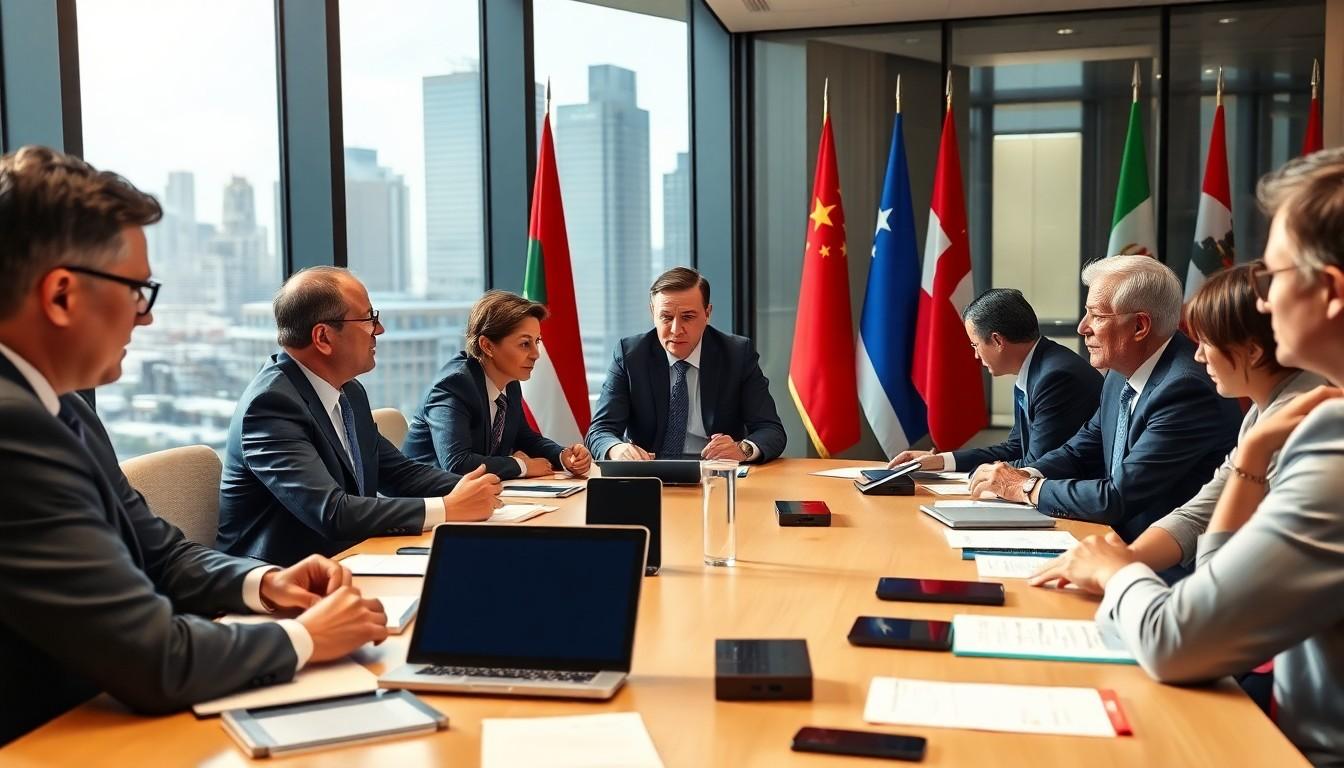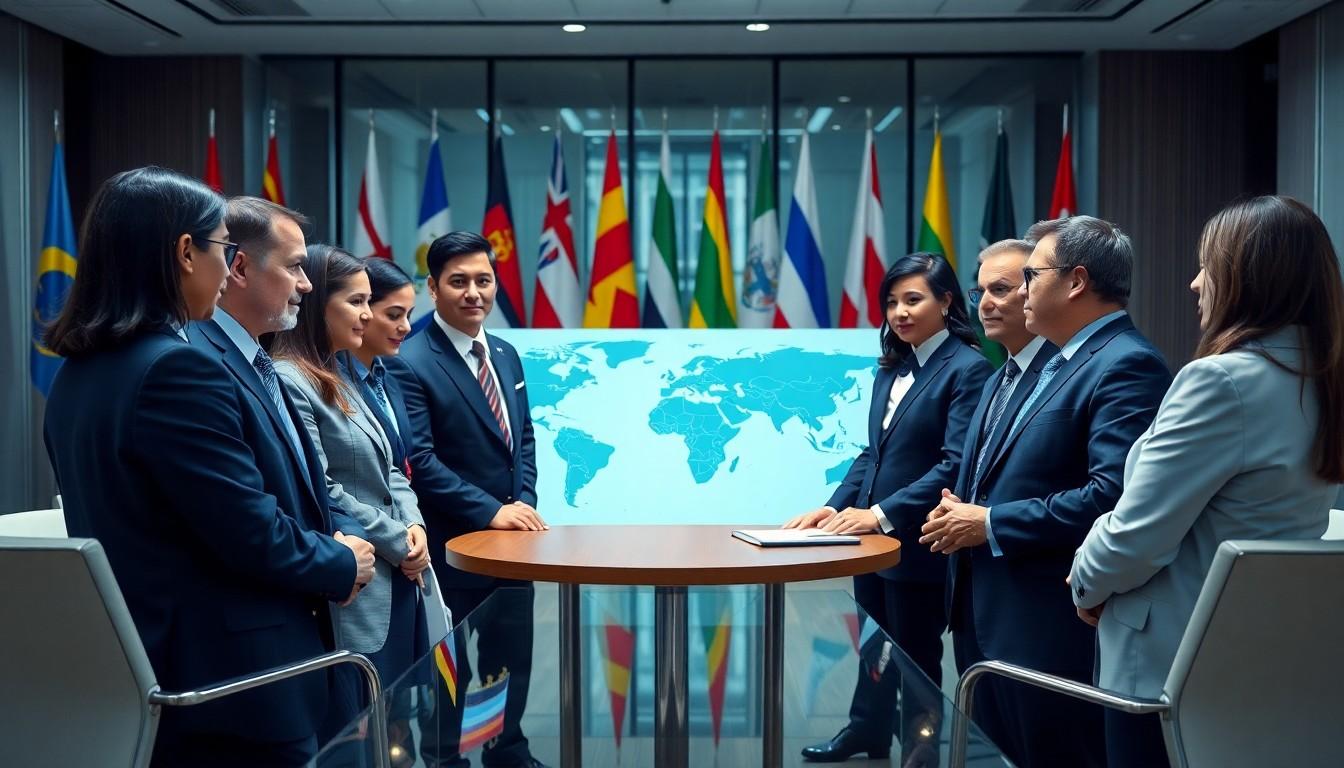The Best Fluffy Pancakes recipe you will fall in love with. Full of tips and tricks to help you make the best pancakes.

Essentials of International Relations: Unlocking the Secrets to Global Diplomacy and Cooperation
In a world where borders are just lines on a map and diplomacy can be as tricky as herding cats, understanding the essentials of international relations is more crucial than ever. From trade agreements to climate change discussions, these interactions shape the future of nations and, let’s face it, our daily lives. So, whether you’re a budding diplomat or just someone who wants to impress at cocktail parties, grasping the basics can give you an edge.
Imagine navigating the complex web of global politics with the finesse of a seasoned pro. It’s not just about knowing who’s shaking hands with whom; it’s about understanding the underlying motivations and strategies that drive these interactions. Dive into the essentials of international relations and discover how these principles can help decode the world stage, making you the go-to guru in conversations about global affairs.
Essentials Of International Relations
International relations encompass a broad range of interactions between countries, including political, economic, and cultural exchanges. Understanding these relations provides insight into how nations communicate, cooperate, and conflict. Diplomacy serves as the backbone of these interactions, facilitating negotiations and fostering peaceful resolutions.
Major theories within international relations help explain dynamics among nations. Realism emphasizes national interest and power, guiding actions in a competitive global landscape. Liberalism focuses on cooperation and collective security, promoting peace through international institutions and agreements. Constructivism highlights the role of ideas and identities, illustrating how perceptions shape diplomatic interactions.
Global issues, such as trade disputes or climate change, exemplify the complexities of international relations. Trade agreements, for instance, impact economies and dictate relationships between trading partners. Climate discussions require collaboration for sustainable solutions, illustrating the necessity of diplomacy in addressing shared challenges.
International organizations, like the United Nations, play critical roles in fostering cooperation. These entities provide platforms for dialogue, enabling countries to collaborate on pressing issues. Their influence helps establish norms and standards that guide international behavior.
Cultural exchanges, too, enhance international relations. They promote understanding and appreciation among nations, bridging gaps caused by geographical and historical divides. By participating in cultural diplomacy, countries can improve mutual respect and trust.
Grasping the essentials of international relations equips individuals with a necessary understanding of global affairs. This knowledge empowers them to engage in informed discussions and navigate the intricate web of international interactions effectively.
Key Theories in International Relations

Understanding key theories in international relations is crucial for analyzing global dynamics. Each theory offers distinct perspectives on how nations interact.
Realism
Realism emphasizes the competitive and conflictual side of international relations. It suggests that states act primarily in their self-interest, seeking power and security. Policies often reflect the anarchic nature of the international system, where no overarching authority exists. Decision-makers focus on national interest, often prioritizing military strength and strategic alliances. Historical events like World War II highlight realism’s relevance, showcasing states’ motivations driven by power and survival. Notable scholars such as Hans Morgenthau and Kenneth Waltz have significantly influenced this theory, presenting arguments that shape current understanding of global politics.
Liberalism
Liberalism presents a more optimistic view of international relations, focusing on cooperation and interdependence. This theory argues that democratic states are less likely to engage in conflicts with one another. Economic ties and international organizations play essential roles in fostering peace. Liberal scholars advocate for diplomacy, trade agreements, and treaties to resolve disputes. Institutions like the United Nations exemplify liberalism’s principles, promoting collective security and global governance. Prominent figures such as Robert Keohane and Joseph Nye contribute to liberal thought, emphasizing the importance of global cooperation in addressing challenges like climate change.
Constructivism
Constructivism emphasizes the social construction of international relations, focusing on identities and beliefs. It argues that the actions of states are not just influenced by material power but also by shared ideas and values. This theory highlights the significance of narratives and perceptions, as they shape how states understand each other. Issues such as human rights and environmental concerns become critical under constructivism, as norms influence state behavior. Scholars like Alexander Wendt and Martha Finnemore have enriched this perspective, demonstrating how collective identities can lead to cooperation or conflict among nations.
Major Actors in International Relations
Understanding the major actors in international relations is essential. These actors play crucial roles in shaping global dynamics.
States
States, as primary actors, exert significant influence on international relations. They pursue national interests through diplomatic, economic, and military means. Each state engages in negotiations to advance its objectives, often influenced by historical contexts and power structures. Examples of influential states include the United States, China, and Russia, known for their global impact. Sovereignty remains a key principle for states, allowing them to operate independently within the international system. The interactions among states often lead to alliances and rivalries, which can change over time.
International Organizations
International organizations contribute to global governance and cooperation. The United Nations stands as a prominent example, facilitating discussions on peace and security, human rights, and humanitarian issues. Organizations like the World Trade Organization and the North Atlantic Treaty Organization play critical roles in economic and military cooperation, respectively. These entities help establish norms and protocols that guide state behavior. They often provide platforms for dialogue, allowing states to collaborate on global challenges. Their influence varies, but their presence is felt across multiple spheres of international relations.
Non-State Actors
Non-state actors, including multinational corporations and non-governmental organizations, increasingly shape the global landscape. They participate in international affairs through advocacy, investment, and service provision. Corporations like Google and ExxonMobil can influence economic policies and market trends worldwide. NGOs, such as Amnesty International and Greenpeace, focus on social issues, environmental protection, and human rights advocacy. By mobilizing resources and public opinion, non-state actors can affect policy decisions at national and international levels. Their involvement highlights the diverse range of influences in contemporary international relations.
Important Concepts in International Relations
Understanding key concepts in international relations is crucial for navigating global interactions. Three of these fundamental areas include national interest, power dynamics, and diplomacy.
National Interest
National interest drives state behavior in international relations. It encompasses economic, political, and security goals that nations prioritize. For instance, preserving territorial integrity remains essential for many countries. Ensuring economic prosperity often shapes trade agreements. Protection against external threats influences national defense policies significantly. States pursue these interests to maintain sovereignty and enhance their global standing. Differences in national interests can lead to competition or cooperation among nations.
Power Dynamics
Power dynamics illustrate the relationships between states in the international arena. Various forms of power exist, such as military, economic, and soft power. Military power typically reflects a country’s ability to project force, as seen in the influence of the United States and China. Economic power often relates to a nation’s market strength and financial resources. Soft power involves cultural influence and diplomacy, allowing states to win hearts and minds. These dynamics shape alliances and rivalries, impacting global stability.
Diplomacy
Diplomacy serves as the primary tool for managing international relations. It involves negotiations and dialogue between states to resolve conflicts and promote cooperation. Traditional diplomacy occurs through formal channels, such as embassies and summits. Track II diplomacy engages non-state actors to foster communication and understanding. Multilateral diplomacy involves multiple nations addressing global issues, such as climate change and humanitarian crises. Active engagement through diplomacy often leads to peaceful resolutions and enhanced international collaboration.
Current Trends in International Relations
Current trends in international relations emphasize the complexities of an increasingly interconnected world. Understanding these trends is crucial for comprehending global dynamics.
Globalization
Globalization significantly shapes international relations by fostering interdependence among nations. Economic ties strengthen through trade agreements and investment partnerships, leading to shared interests. Cultural exchanges enhance mutual understanding, enabling cooperation in various sectors. Technology also accelerates globalization, facilitating real-time communication and information exchange. Countries face challenges, such as economic disparity and cultural homogenization, which can fuel tensions. Moreover, globalization affects national sovereignty as states navigate external influences on domestic policy. Countries must balance their interests against global demands, striving for an effective integration strategy.
Climate Change
Climate change ranks among the most pressing issues in international relations today. Global warming transcends national borders, requiring collaborative efforts to mitigate its effects. Agreements like the Paris Accord illustrate how countries unite to address environmental challenges. Rising sea levels and extreme weather events prompt nations to reassess their policies and priorities. The shift toward renewable energy sources also gains traction as countries seek sustainable solutions. Cooperation among states, NGOs, and businesses is essential for innovation and resource management. Climate change often becomes a focal point in diplomatic negotiations, reinforcing the need for a unified global approach.
Understanding the essentials of international relations is crucial for navigating today’s complex global landscape. As nations grapple with shared challenges like climate change and economic disparity, the ability to engage in informed discussions becomes increasingly valuable.
Grasping the motivations behind state behavior and the dynamics of power can empower individuals to contribute meaningfully to conversations on global affairs.
With the rise of non-state actors and the significance of diplomacy, the landscape of international relations continues to evolve. Embracing this knowledge not only enhances personal insight but also fosters a deeper appreciation for the interconnectedness of our world.
